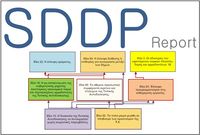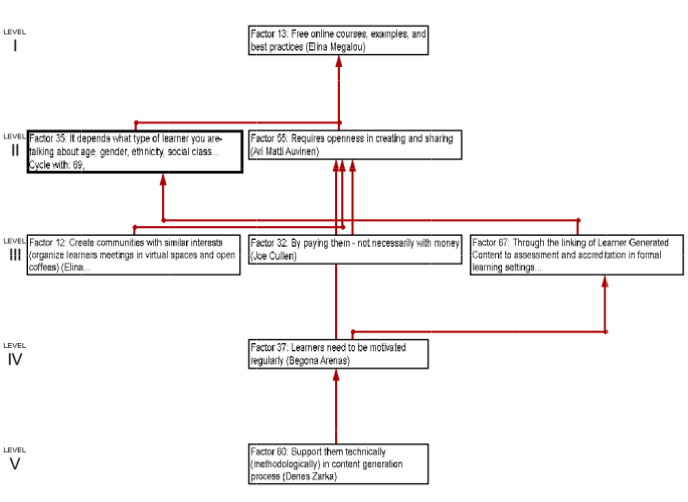E-Hoop SDDP Germany
|
Executive Summary
The Structured Democratic Dialogue co-laboratories were organized with aim to analyze the needs of the intended users with respect to their learning needs, as well as their needs with regards to the E-Hoop project platform. The intention was to identify obstacles that prevent learners from benefiting maximally from their current educational institution due to differences (disabilities, socioeconomic background etc.).
The New Technologies and Learning in Europe (NTL) organized on the 11th of October 2013 a Co-Laboratory in order to accumulate the collective wisdom of experts regarding the means that learners can be supported to generate learning content. The Co-Laboratory, which was facilitated by members of Future Worlds Center was attended by 13 international researchers, experts and decision makers. The process was supported by Cogniscope 3.
The Triggering Question (TQ) of the first workshop was:
"How can learners be supported to generate learning content?"
In response to the TQ, the 13 participants came up with 69 ideas, which were categorized in 12 clusters. Following the voting process, 32 ideas received one or more votes and were structured to create the influence MAP shown below.
According to the participants of this workshop, the ideas that appear to be the most influential were:
- Idea #60: Support them technically (methodologically) in content generation process
- Idea #37: Learners need to be motivated regularly
- Idea #12: Create communities with similar interests (organize learners meetings in virtual spaces and open coffees)
- Idea #32: By paying them – not necessarily with money
- Idea #67: Through the linking of Learner Generated Content to assessment and accreditation in formal learning settings
- Idea #35: It depends what type of learner you are talking about; age, gender, ethnicity, social class
- Idea #55: Requires openness in creating and sharing
- Idea #13: Free online courses, examples, and best practises
The workshop was mainly facilitated by Yiannis Laouris and Katerina Fotiou (CNTI).
In sum, the participants of the dialogue reported their satisfaction that they had the opportunity to exchange ideas via the structured dialogue process which empowered the participants to identify and understand the dangers of Internet use.
Participants
| Name |
|---|
| Airina Volungeviciene |
| Anthony F. Camilleri |
| Ari Matti Auvinen |
| Begona Arenas |
| Denes Zarka |
| Elina Megalou |
| Giles Pepler |
| Grainne Conole |
| Ildiko Mazar |
| Joe Cullen |
| Steve Wheeler |
| Thomas Kretschmer |
| Thomas Richter |
External Links
http://www.e-hoop.info/ [[Category:SDDP (Education)]

